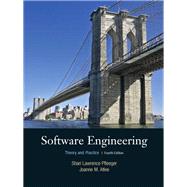
Note: Supplemental materials are not guaranteed with Rental or Used book purchases.
Purchase Benefits
What is included with this book?
Shari Lawrence Pfleeger (Ph.D., Information Technology and Engineering, George Mason University; M.S., Planning, The Pennsylvania State University; M.A., Mathematics, The Pennsylvania State University; B.A., Mathematics with high honors, Harpur College, Binghamton, NY) is a senior researcher at RAND’s Arlington, VA office where she helps organizations and government agencies understand whether and how information technology supports their mission and goals. Dr. Pfleeger began her career as a mathematician and then a software developer and maintainer for real-time, business-critical software systems. From 1982 to 2002, Dr. Pfleeger was president of Systems/Software, Inc., a consultancy specializing in software engineering and technology. From 1997 to 2000, she was also a visiting professor at the University of Maryland's computer science department. In the past, she was founder and director of Howard University's Center for Research in Evaluating Software Technology (CREST), and was a visiting scientist at the City University (London) Centre for Software Reliability, principal scientist at MITRE Corporation's Software Engineering Center, and manager of the measurement program at the Contel Technology Center (named by the Software Engineering Institute as one of the best such programs in the country). Dr. Pfleeger is well-known for her work in software quality, software assurance, and empirical studies of software engineering; she is particularly known for her multi-disciplinary approach to solving information technology problems.
She is also well-known for her publications, many of which are required reading in software engineering curricula, including "Software Engineering: Theory and Practice" (3rd edition, with Joanne Atlee, 2005, Prentice Hall), "Security in Computing" (3rd edition, with Charles P. Pfleeger, 2003, Prentice Hall), "Solid Software" (2001, with Les Hatton and Charles Howell, Prentice Hall), and "Software Metrics: A Rigorous and Practical Approach" (2nd edition, with Norman Fention, 1996, Boyd and Fraser Publishers). Dr. Pfleeger is book review editor for IEEE Security and Privacy. For several years, she was the associate editor-in-chief of IEEE Software, where she edited the Quality Time column, and then associate editor of IEEE Transactions on Software Engineering. From 1998 to 2002, she was a member of the editorial board of Prentice Hall's Software Quality Institute series. She is a senior member of IEEE, the IEEE Computer Society, and the Association for Computing Machinery.
Joanne M. Atlee is an Associate Professor in the School of Computer Science at the University of Waterloo. Her research program focuses on software modeling, documentation, and analysis, with a particular emphasis on what she calls practical formalisms: specification and design notations that are practitioner-friendly but have a precise semantics suitable for automated analysis. More recently, she has been working on configurable model-driven development, whereby modeling notations, analysis tools, and code generators can be configured via semantics parameters.
Atlee was the founding Director of Waterloo’s Software Engineering degree program. She served on the Steering Committee for the Computing Curricula Software Engineering volume, co-sponsored by IEEE-CS and ACM. She is the vice chair of the International Federation for Information Processing (IFIP) Working Group 2.9 on software requirements engineering. Atlee was the program-committee chair for the International Conference on Requirements Engineering in 2005 (RE'05), and will be co-chair of the program committee for the International Conference on Software Engineering in 2009 (ICSE'09). She is a co-author with Shari Lawrence Pfleeger on the textbook "Software Engineering - Theory and Practice."
| Preface | |
| Why Software Engineering? | |
| What Is Software Engineering? | |
| How Successful Have We Been? | |
| What Is Good Software? | |
| Who Does Software Engineering? | |
| A Systems Approach | |
| An Engineering Approach | |
| Members of the Development Team | |
| How Has Software Engineering Changed? | |
| Information Systems Example | |
| Real-Time Example | |
| What this Chapter Means for You | |
| What this Chapter Means for Your Development Team | |
| What this Chapter Means for Researchers | |
| Term Project | |
| Key References | |
| Exercises | |
| Modeling the Process and Life Cycle | |
| The Meaning of Process | |
| Software Process Models | |
| Tools and Techniques for Process Modeling | |
| Practical Process Modeling | |
| Information System Example | |
| Real-Time Example | |
| What this Chapter Means for You | |
| What this Chapter Means for Your Development Team | |
| What this Chapter Means for Researchers | |
| Term Project | |
| Key References | |
| Exercises | |
| Planning and Managing the Project | |
| Tracking Progress | |
| Project Personnel | |
| Effort Estimation | |
| Risk Management | |
| The Project Plan | |
| Process Models and Project Management | |
| Table of Contents provided by Publisher. All Rights Reserved. |
The New copy of this book will include any supplemental materials advertised. Please check the title of the book to determine if it should include any access cards, study guides, lab manuals, CDs, etc.
The Used, Rental and eBook copies of this book are not guaranteed to include any supplemental materials. Typically, only the book itself is included. This is true even if the title states it includes any access cards, study guides, lab manuals, CDs, etc.